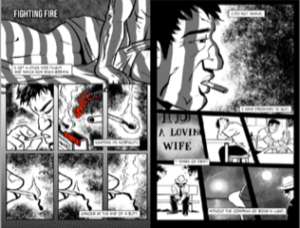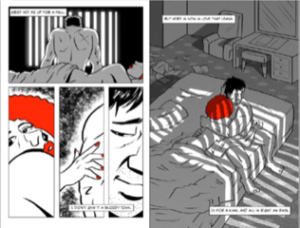
Felix Cheong
1. Felix, you are a seasoned writer. When did you first begin writing?
I wrote my first poem at the awkward, untoward age of 17 when I had a crush on a classmate and wanted to gift her something special for Valentine’s Day. I thought a poem, handwritten on a homemade card, was the most romantic thing. But it was a terrible acrostic piece, as teens with more hormones than poetic sense are wont to write. Thankfully, as Auden points out, “poetry makes nothing happen”, so nothing happened! But that was the firing gun that got me into poetry.
2. You have explored many writing genres including non-fiction and prose. When did you first come in contact with the subgenre of poetry comics?
The blame isn’t all mine – the lockdown in 2020 has to shoulder some of it! With the Devil finding words for idle minds, I began writing a cycle of poems about the pandemic. But the eight poems were too few for a volume, but too precious to be thrown out.
That was when I stumbled upon “The Giant Slide”, a poetry comic based on a poem by Ted Kooser. It was a fresh, refreshing way of presenting (or re-presenting) poetry – not as lines in solitary confinement on a page, but as comic strips, peopled by characters who live within panels and talk in speech bubbles. I then found a collaborator in Eko, who understood what I was after. Seven months later, we published In the Year of the Virus, the first poetry comics book in Singapore.
3. Why did you decide to explore the subgenre of poetry comics?
To be sure, poetry comics is not to be confused with illustrated poetry, which has a much longer history (think William Blake, Stevie Smith and, in children’s writing, Shel Silverstein). Illustrated poetry comes with an accompanying visual which adds value to but takes nothing away from the poem; the lines can be read on their own, as you would a page poem.
Poetry comics, on the other hand, is a more recent development and hinges on the poem working in tandem with the artwork. Take either away, and the jenga structure collapses. You’re the poorer for it because both text and image have to be read at the same time.
That’s one reason why I began exploring this subgenre – a way of trafficking poetry to the comics crowd, and vice versa.
After my experience and experiment with In the Year of the Virus, I dusted off an unfinished verse novel, Sprawl(which had been doing time in a folder marked “Abandoned Book Projects” in my laptop), and rewrote it as a noir detective graphic novel. It was then adapted by Malaysian artist Arif Rafhan and published in 2021. The sequel, Sprawl: God’s Lonely Man, was released last year. We had also collaborated on a young adult graphic novel, Eve and the Lost Ghost Family.
4. What are some of the merits of this genre and how do you approach working in this genre?
Poetry comics offers a creative challenge at two levels: The poems are not written as discrete pieces and later curated to a thematic thread, but as chapters at the service of a larger narrative. In other words, story and character precede writing.
At the same time, I have to be conscious of leaving gaps for the illustrator to plug, what I call “visual poetics” – treating poetry as a sound-and-vision medium, as if you’re readying it for a screenplay.
For instance, “Fighting Fire”, the fourth poem in Sprawl (the book was named by American comics magazine The Comics Beat as one of 75 anticipated graphic novels for summer 2022 https://www.comicsbeat.com/anticipated-graphic-novels-for-summer-2022/ was originally written to set up detective Sam’s character. As he smokes (or attempts not to smoke) outside the police station where he works, something of his nihilism comes through:
Fighting Fire
I light a stick
and watch how each breath
hastens its mortality
between my fingers,
how it is taken seriously,
cancer at the end of a butt.
I do not inhale,
I have promises to quit
and not enough bridges to burn.
Fifteen minutes of linger
and it heaves finally,
its life its own cremation.
No contest, I win this round,
but only just. Ashes
don’t tell stories.
The revised version pared the poem down to just 12 lines and the scene was changed to a post-coital reflection. More importantly, I included endnotes (which I did for all 19 poems in the manuscript) for Arif to contextualise the scene:
Fighting Fire
I set a stick into flight
And watch how each breath
Hastens its mortality,
Cancer at the end of a butt.
I do not inhale,
I have promises to quit.
7 years of drift
Without the compass of Rose’s light.
Grief set me up for a fall.
I didn’t give it a bloody toss.
But here is now is love that leans
In for a kiss. And all is right as rain.
Notes:
I imagine this poem beginning in a dim motel room. Sam is lighting up a cigarette after sex with Bess. As he’s smoking (or not smoking, since he knows smoking kills), he reflects.
Part of his backstory emerges – how his wife had died 7 years ago of lung cancer (“I have promises to quit”) and all he’s doing is living day by day (“Without the compass of Rose’s light”).
Bess and Sam seem to have some kind of connection. It’s not just a one-night stand. She reminds him of his late wife. Over several weeks, they date.


It goes without saying, of course, you need a collaborator whose vision aligns with yours, whose artwork feels right for the book. For instance, before Arif, I had approached another illustrator but her style (she had produced a few sample pages) was too manga. Similarly, for Eve and the Lost Ghost Family, I had to “audition” three other illustrators before Arif came up with what I felt was exactly the look I had envisioned for the story.
But the downside to this subgenre – as with any hybrid genre – is you end up in no-man, nomad (“no, mad!”) land. Either you’re here or there, but being neither here nor there puts you in that awkward, untoward position, i.e. between the cracks. The poetry reader can’t put a finger on what you’re trying to do; ditto the comics reader.
_________________________________________________________________________________
For sample pages of Sprawl, readers can check out: https://www.marshallcavendish.com/docs/default-source/default-document-library/sample-spreads—sprawl.pdf?sfvrsn=eaadc4b0_1
For Sprawl: God’s Lonely Man, check out: https://www.marshallcavendish.com/docs/default-source/default-document-library/sprawl-god’s-lonely-man-(sample-spreads).pdf?sfvrsn=8b22a0c0_1
All Felix’s poetry comics titles can be found on amazon.sg and amazon.com
